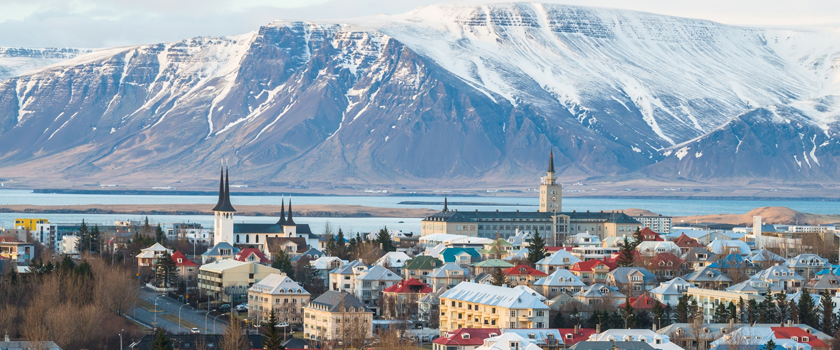Icelanders pride themselves on keeping their mother tongue free of foreign influence. They create their own words for modern terms instead of adopting foreign ones, like the Icelandic word for “computer” – solve.
Despite this linguistic purism, most Icelanders are multilingual, with the majority having a solid command of English and another Scandinavian language. This results from English being taught as a second language in schools.
Icelandic
Icelandic is the country’s official language, which has changed little since the island’s settlement. It’s a form of Old Norse and related to Faroese and Norwegian. Despite its close connections with the Scandinavian languages, Icelandic is an Indo-European language from the sub-group of North Germanic languages.
Icelanders place great emphasis on preserving their language and culture, which has been beneficial in safeguarding this unique dialect. Icelandic is a relatively complex language to learn, especially for foreigners. It uses a lot of fricatives (the th sound), so it’s not for beginners to the Indo-European languages. Icelandic also has ten tense forms, which can be confusing to foreigners.
Fortunately, Icelanders are a friendly and welcoming people. They tend to speak English in addition to their native tongue and are often willing to help visitors with pronunciation and vocabulary.
Icelandic is a vibrant and poetic language, making it fun to study. Many words have similar forms to the English language, and there are also a lot of loanwords from other European languages, such as French and Low German. Icelanders are familiar with most of these other languages, as they are taught in school along with their native language. The education system focuses on teaching students English from a young age and encourages them to learn another Scandinavian language, Danish.
Danish
Although Icelanders are proud of their mother tongue and most of them are multilingual, they also embrace foreign languages, what language do they speak in Iceland? The vast majority of Icelanders speak English, which is taught in schools. In addition, there are about 1,000 native Danish speakers in the country. Both languages are related to Old Norse, the language used by the Viking settlers of Iceland. They share many grammatical similarities, including noun declension, verb conjugation, and word order.
The island’s isolation from mainland Europe was crucial in preserving the language closer to its original form. This is why Icelandic children today can read the Sagas and Eddas written a thousand years ago in Old Norse.
Icelandic has generally remained more conservative than other Scandinavian languages, such as Norwegian and Danish. However, there are notable differences between the Western Jutlandic dialect and Standard Danish. For example, in Standard Danish, words in the masculine and feminine genders use the same article. However, in the Western Jutlandic dialect, a man is a mand, and a house is aet hus.
Icelanders have a knack for devising their own words to help protect the integrity of the language. For instance, Icelanders use tolvu for “computer” rather than adopting a Swedish or Danish word. Creating new words is one of the ways that Icelanders preserve their cultural heritage while still accommodating those who wish to learn English.
English
In addition to Icelandic, the official language of Iceland, most people speak English. This isn’t because they are not fluent in their native tongue but because English is mandatory in schools. Many Icelanders also speak one or more foreign languages, such as Danish, Norwegian, Faroese, and German.
Although Iceland is a relatively isolated island, outside influences have affected the Icelandic language significantly. As an insular language, it has remained almost unchanged since the Viking days. This makes it unique and challenging to understand for those unfamiliar with it.
The Icelandic language has a highly complicated grammar and vocabulary, with many sounds that don’t exist in other languages. For example, there are no letters like s or z, and the letter k is pronounced differently in Iceland than in other Scandinavian languages. The pronunciation of words is also influenced by the context in which they are used. For example, the word “fjord” is pronounced fjórdh or fjórdh, depending on the context.
However, most Icelanders are proficient in English, which helps them communicate with travelers worldwide. Some Icelanders are fluent in Polish, Lithuanian, French, and German. Additionally, there are about 200 deaf people in Iceland who speak Icelandic Sign Language.
German
Iceland’s language is a legacy of the Norse settlers who established their homeland 1,150 years ago. The language is closely related to the Faroese, Norwegian, Danish, and Swedish languages, which also belong to the North Germanic group of languages. Icelandic is distinct from the others despite its similarities because it is inflected with four cases. For example, each case has a different word for snowfall (dative, accusative, or genitive). Icelanders are also known for their linguistic purism, creating new words instead of adopting foreign ones. For instance, a computer in Icelandic is called Volvo, which combines two Icelandic words: tala, meaning number, and volva, fortune teller.
The Icelandic language is a cornerstone of the country’s national identity, and Icelanders are committed to preserving its cultural heritage. Icelandic promotes communication and social cohesion within and beyond the country’s borders.
Iceland’s emphasis on language education helps cultivate a multilingual society and promotes cross-cultural understanding. The Icelandic language is taught as a core subject in schools, along with Danish and English. In addition, Icelandic is often spoken in public spaces and used in the media. This linguistic consistency reflects the country’s commitment to maintaining its unique linguistic heritage while embracing the importance of multilingualism in a globalized world.

